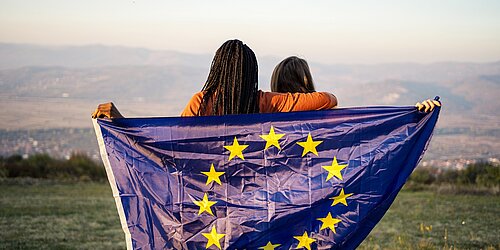Copyright: AdobeStock / flowertiare
Project background
Electronic Public Participation is a vital element of modern democracy. Especially when it comes to infrastructural projects such as power plants or railway networks, the whole society is affected. The legislation of the European Union (EU) provides for a comprehensive Environmental Impact Assessment (EIA), where the public concerned can contribute its needs and expertise. Authorities are obliged to publish information on the planned projects and offer online EIA-portals. Yet the implementation of EIA-portals and the state of digitalisation of environmentally relevant administrative procedures is quite inconsistent across member states of the EU.
This also has been shown in times of the Covid19 pandemic when the need for electronic participation formats became more important than ever. The particular challenges of the pandemic demanded rapid legislative action and ad-hoc measures, also in the areas of domestic planning and licensing law. The legislative approaches by member states have varied across the EU. Germany, for example, has enacted the Planning Security Act (Planungssicherstellungsgesetz) to ensure public participation in environmentally relevant administrative procedures during the pandemic. This law opens up possibilities of digital announcement of projects, online display of documents or conducting hearings in which statements and objections regarding the planning or approval procedure are discussed jointly via video conferences. However, the lack of implementation points out the need for a comprehensive analysis of how traditional participation formats can be transferred into digital formats without losing crucial participatory elements.
The thrust of the pandemic has made it clear that there is a need to recalibrate public participation in environmental protection. This requires a uniform, digitalisation-friendly legal framework as well as the creation of digital competencies within the regulatory authorities and the civil society.
Project goals and measures
The overall objective of the project “Aarhus-Strong” is to strengthen electronic participation practices of member state authorities within the EU. It must be ensured that the environmental administration takes greater account of the expertise, perspectives and proposals for action of the public and environmental associations in the planning and approval of environment-related projects, plans and programmes.
In cooperation with four project partners in member states within the EU, the current situation of electronic participation practices in the selected countries will be analysed as well as national challenges and possible courses of action in electronic public participation in environmentally relevant planning and approval procedures. Country experts will have the opportunity of a professional exchange through workshops, discussions and networking.
Furthermore, a contest will be held – the so-called “European Innovation Lab” – which allows young professionals from the EU to bring in their perspectives and proposals and to design a platform that meets the demands and goals of modern digital public participation.
To recalibrate public participation in environmental protection, the findings from desk research, the workshops with country experts and the competition will be incorporated in an innovative practice-oriented participation guide for environmental authorities within the EU. The focus will be on digital, formal participation procedures and participation platforms like EIA-portals.
